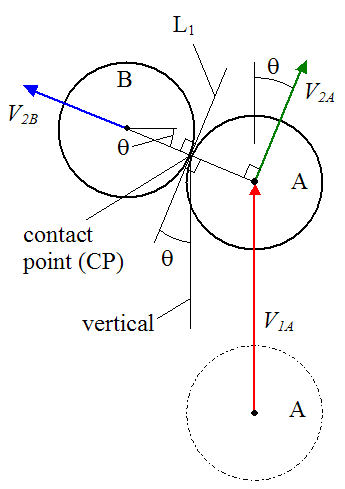 |
| Predator-vision |
Besides earning a story to tell, I also learned how to see rates of flow. I was suddenly able to see the various heat sources and sinks in my house, with vectors of various strengths showing the direction and rates of flow. Unconsciously, I had always thought of heat as being a property of a room or building, but I now saw heating the way physicists see it.
 |
| Locke-vision |
One of the most natural ways of seeing the world is as a collection of things with properties. This view was best put down on paper by modern philosophers like John Locke. They went back and forth about how subjective 'secondary' qualities like color and taste could be known to be true to the 'primary' essence of a thing, but they never questioned the atomistic model of the universe. This was only natural when the physics of the day characterized the interactions of the universe by analogy to billiard balls.
I've been trying to get my head around some hard accounting problems, and I realized that my problem was thinking of accounts as things with properties. It is correct, in a sense, to describe accounts as having a dollar amount. But is is more correct to think of them as part of a system of interconnected accounts with various directions and rates of flow, much like the heat in my cold house. This is because the value of an account is constantly changing, and because its changes are the direct result of transfers from other accounts. Even the cash in your wallet is not separate from this plumbing. I've begun to see the systems I build and maintain as part of the flow of the entire monetary system.
This flow is becoming particularly interesting with the growth of currency-less transactions like ACH. If you get direct deposit, you use ACH. In the future, there will be no paper or coin currency. We'll simply transfer funds between accounts with smartphones or other devices. There are many fascinating consequences of the death of currency. For instance, if governments do not have to pay the cost of printing money, the cost of transacting will be borne by retailers in the form of transaction fees. Someone will also need to bear the cost of information theft when you lose your phone.
 |
| $0.01, spent at all places and times |

A few thoughts:
ReplyDelete1) Unfortunately, my incoming money pipe is smaller than my outflow one.
2) I saw a crazy molecular theory postulated the other day (but haven't actually investigated it) -- namely, that all matter, all space, all time, is just ONE electron phasing in and out of time and dimension.
3) Seems to me that lack of physical currency increases the likelihood that its value will decrease; when you have actual brass in pocket you know what you're spending and have spent and it tends to slow down that cash outflow. Anyone who's ever kited a check or maxed out their credit card knows how easy it is to ignore your common monetary sense.
BDW,
ReplyDeleteExactly! The more things become electronic, the easier it will be to spend. Increasing the rate of spending effectively increases the money supply, which causes inflation or the devaluation of money. Can the rate of flow be increased so much that money has no value?
Zach
You just blew my mind.
ReplyDelete(Aren't we headed that direction already? Is there any real relationship between the price of a product and it's actual value? Isn't the best way now to accumulate capital just placing one's self in the fastest stream of money flow?)
I don't know! I'm going to ask some smart people this question and report back.
ReplyDeleteWell, I asked an expert, and he says that inflation cannot occur because of instant banking transactions, since the amount of money coming in will be the same as money going out. An instant reconciliation process would require the two sides to be the same.
ReplyDelete